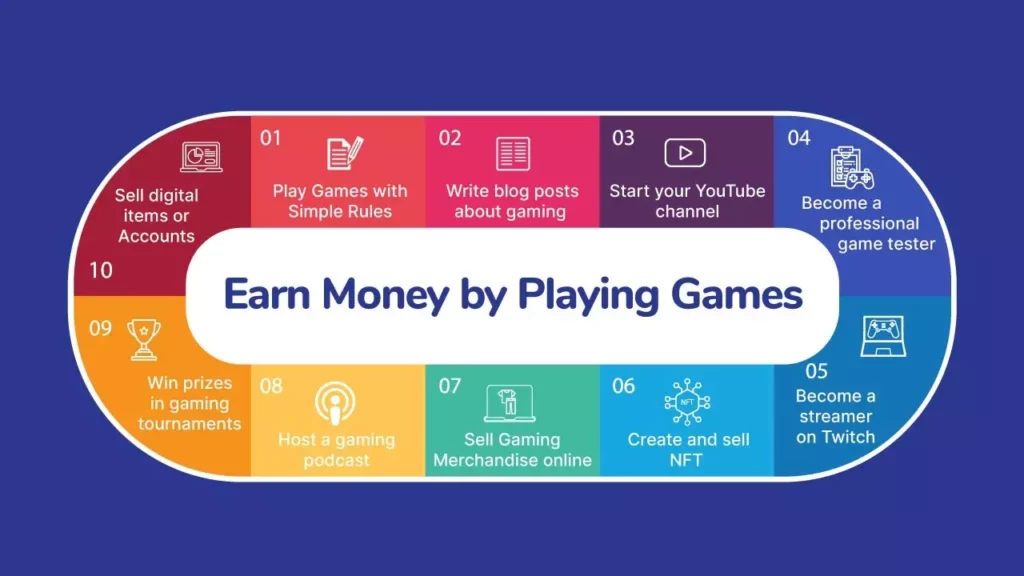Exactly How Play-to-Earn Gamings Are Revolutionizing the Video Gaming Market

Comprehending Play-to-Earn Mechanics
The play-to-earn design has actually become a revolutionary principle within the video gaming market, fundamentally modifying the partnership between players and the games they engage with. This design enables players to make concrete incentives, often in the type of cryptocurrencies or non-fungible tokens (NFTs), via their in-game activities. Unlike conventional video gaming structures that typically monetize through membership charges or one-time acquisitions, play-to-earn games incentivize player participation by directly connecting gameplay achievements to real-world value.
At the core of play-to-earn mechanics is the combination of blockchain innovation, which makes sure transparency and provable ownership of in-game assets. Gamers can get, offer, or trade these possessions in decentralized marketplaces, empowering them with financial agency formerly undetected in traditional video gaming environments. Each player's contribution to the video game ecological community-- be it via proficient play, calculated trading, or area involvement-- boosts the general gaming experience while offering them an opportunity to create earnings.
As players spend time and sources, they not just deepen their involvement with the video game but also cultivate a vibrant economic climate that mirrors their cumulative efforts (play and earn rewards). This improvement of gameplay into a monetizable venture is improving both player inspiration and video game layout
Financial Influence On Players

Furthermore, play-to-earn models equalize accessibility to economic benefits. Players from varying socio-economic histories can get involved and potentially make significant earnings, connecting gaps that exist in standard job markets. This paradigm shift fosters monetary freedom, especially in regions where work chances may be restricted.
Furthermore, the intro of online economic climates allows gamers to develop wealth via tactical investments in in-game possessions, which can appreciate over time. This has actually caused the development of a brand-new class of players who come close to play-to-earn as a major income-generating task, commonly resulting in the reinvestment of earnings right into the gaming environment itself. Ultimately, the financial effect on gamers is profound, as they browse a landscape where recreation and income merge.
The Role of Blockchain Innovation
What makes blockchain innovation a keystone of play-to-earn games is its ability to offer transparency, decentralization, and safety. By utilizing a distributed journal system, blockchain guarantees that all purchases within the video game are tape-recorded in an immutable way, permitting players to confirm ownership of in-game possessions without relying upon a main authority. This openness promotes count on amongst players, as they can individually verify the deficiency and provenance of electronic items, improving their value.
Additionally, blockchain innovation encourages gamers through decentralization, allowing them to involve in peer-to-peer transactions. Players are no longer confined to in-game economic climates regulated by developers; instead, they can trade, sell, or lease their assets freely in open marketplaces. This shift not only enhances the overall liquidity of digital properties yet likewise motivates even more significant player interaction, as users can directly take advantage of their time and effort invested in the video game.
In addition, blockchain assists in the production of smart agreements, which automate different in-game procedures, from rewards distribution to governance devices. play and earn rewards. This technology lowers the threat of scams and makes certain fair game, additional solidifying blockchain's indispensable duty in the advancement of play-to-earn gaming
Challenges and Objections
Often, play-to-earn video games deal with significant obstacles and criticisms that can hinder their development and approval within the wider gaming area. One main concern is the possibility for a speculative bubble, where the value of in-game assets can vary substantially, bring about monetary losses for players. This volatility undermines the stability that traditional pc gaming atmospheres normally use.
Furthermore, the assimilation of blockchain innovation often elevates questions regarding environmental sustainability. The power consumption connected with particular blockchain networks has stimulated discussions pertaining to the environmental influence of these games. Critics say that the carbon footprint produced by play-to-earn systems could discourage eco-conscious gamers.
Furthermore, there are issues regarding accessibility and inclusivity. Many play-to-earn video games call for gamers to invest considerable ahead of time capital to acquire needed possessions, creating obstacles for those with limited monetary sources. This version can inadvertently develop a divide between wealthier players and those who can not pay for to get involved.
Future Fads in Video Gaming
As the gaming industry continues to progress, numerous future fads are arising that pledge to reshape the landscape of play-to-earn games and past. One substantial fad is the increasing assimilation of blockchain modern technology, which boosts openness and security in transactions. This click this site will likely result in higher count on amongst gamers, motivating larger adoption of play-to-earn models.
In addition, the surge of non-fungible symbols (NFTs) is readied to reinvent digital ownership, permitting players to genuinely have in-game assets. This change will certainly not only encourage players but likewise develop new financial chances within the online ecosystem. More hints The convergence of gaming with various other industries, such as social media and decentralized financing (DeFi), is anticipated to promote innovative gameplay auto mechanics and monetization methods.
Additionally, improvements in artificial knowledge and artificial intelligence will make it possible for extra tailored video gaming experiences, accommodating individual gamer preferences and boosting interaction. Ultimately, the growing focus on community-driven growth will likely influence video game layout, as players progressively join shaping their video gaming settings. Collectively, these patterns show a transformative future for the video gaming sector, where play-to-earn models will play a main duty in redefining gamer interaction and worth creation.
Conclusion
Finally, play-to-earn video games stand for a significant shift in the pc gaming sector, cultivating financial opportunities through ingenious mechanics that leverage blockchain technology. This design not only democratizes access to financial advantages for players from various socio-economic histories but also urges area engagement and empowerment. Despite encountering criticisms and challenges, the potential for future developments suggests that play-to-earn video games will remain to shape the gaming landscape, providing new opportunities for riches development and player involvement.
The emergence of play-to-earn video games stands for a substantial shift in the gaming sector, improving the partnership in between gamers and the digital economic climate (play and earn rewards).The play-to-earn model has arised as an innovative concept within the pc gaming market, essentially altering the partnership in between players and the games they involve with. Unlike typical video gaming frameworks that commonly monetize with subscription costs or single purchases, play-to-earn games incentivize player participation by straight linking gameplay success his explanation to real-world value
These innovative pc gaming systems equip players to create real-world earnings via their in-game activities, thus changing the standard notion of video gaming from a mere activity into a sensible economic possibility. In spite of encountering criticisms and obstacles, the potential for future innovations suggests that play-to-earn video games will proceed to shape the gaming landscape, supplying new opportunities for wealth development and player participation.